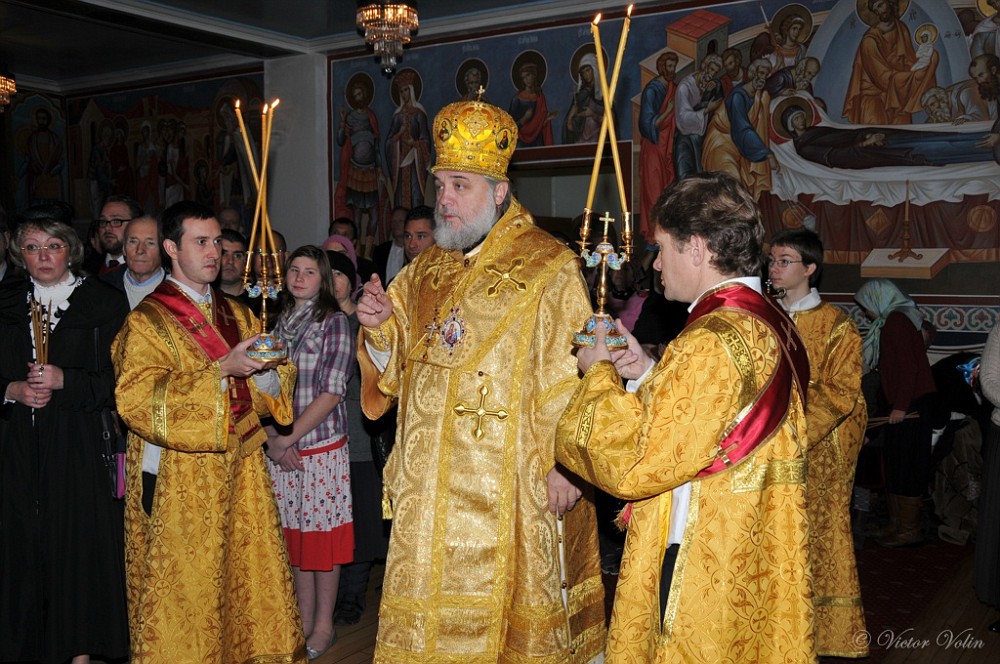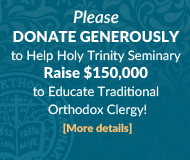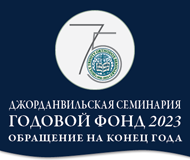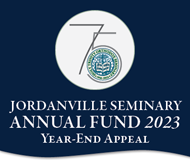News

Celebration of the 90th anniversary of the Russian Church Abroad in the Canadian Diocese
10:27 PM
The 2010 marks the 90th anniversary of the canonical founding of the Russian Orthodox Church Abroad. This significant event in Russian history was solemnly celebrated in the Canadian Diocese.
With the blessing of His Grace, Gabriel, Bishop of Montreal and Canada, it was decided to hold the celebration on November 7/20 and 8/21, at the Holy Trinity church in Toronto, Ontario, – the largest parish of the Church Abroad. The date for the celebration was not chosen by accident. It was during these days in 1920, aboard the ship “Great Prince Alexander Mikhailovich” (one of those used by the Russian exiles leaving Crimea), near the shore of Istanbul-Constantinople, then in the city itself, that the first sessions of the Temporary Highest Church Administration in the South of Russia took place under the presidency of the Most Blessed Metropolitan Anthony (Khrapovitsky), which gave the beginning to the existence of the Russian Church beyond the borders of our Fatherland.
The first session took place on November 6/19, 1920, then, a day later, on November 7/20, of the same year, the well-known ukaz number 362 of St. Tikhon, the Patriarch of Moscow, the Holy Synod and the Highest Church Council of the Russian Church, that, in particular, stated: “2. In the event that a diocese… will be unable to communicate with the HCA (Highest Church Administration), or the HCA itself, headed by the Patriarch for some reason will cease its activity, the diocesan hierarch must immediately contact the hierarchs from the neighboring dioceses in order to organize the Highest Church Administration… 3. The care for organizing the “Highest Church Administration, for those… in circumstances described in paragraph 2 …is the indispensable duty of the highest ranking hierarch in the said group.”
Nine decades later, on exactly the same day, in the parish hall of the Holy Trinity cathedral in Toronto, a youth conference began, which also opened the Diocesan solemnities. In his opening remarks, His Grace, Vladyka Gabriel, in particular, touched upon those numerous difficulties, experienced by the bearers of the Orthodox worldview in contemporary setting, especially for the Russian people outside of Russia. Vladyka noted that in our times, when maybe even the gadarene demoniac, whose story is related in Holy Scripture, would be considered if not healthy, then at least only in need of a psychotherapist, people do not notice the influence of the evil spirits, although their activity now is seen almost more than in the times of the earthly life of the Lord Jesus Christ. He especially underscored that one may find salvation from the demonic activity of this world exclusively within the fold of the Church, and that the founding, by the will of God, of the Russian Church Abroad allowed our immigration to preserve both our spiritual and Russian identity.
After a lively discussion of Vladyka’s opening remarks, participants in the conference were offered a presentation prepared by the choir conductor G.A. Skok. His presentation offered a detailed look at the history of the Canadian Diocese of the Russian Church Abroad.
The conference was concluded by Protopriest Vladimir Morin, rector of the church of Christ the Savior in London, Ontario, talking about the first in the last 90 years visit of the wonderworking icon of the Mother of God of “Kursk-Root” to the Fatherland. Protopriest Vladimir was a member of the delegation that took the Directress of the Russian Diaspora on the trip to Russia. This trip became a great spiritual event, in some way a crowning of the grace-filled process of the reestablishment of the unity of the Russian Church. He illustrated his story with a documentary film about both the wonderworking “Kursk” icon of the Theotokos and about the way, in which the regenerating Orthodox Russia met this holy icon.
At 7:00 PM, all-night vigil began; it went with a special pious inspiration, assisted in this greatly by the tender singing of the cathedral choir under the guidance of G.A. Skok. During the polyeleos, Vladyka Gabriel was serving with the rector of the Trinity cathedral, mitered protopriest Vladimir Malchenko, mitered protopriest Sergey Rasskazovsky (Patriarchal Representation, Parish of St. Tikhon, Patriarch of Moscow), who came especially for the feast, protopriests Vladimir Morin and Michael Lyuboshchinskiy (Protection church, Hamilton, Ontario), priests Viatcheslav Davidenko (Toronto) and Alexey Pjawka (Protection Memorial church, Ottawa, Ontario), along with protodeacon Vasili Milonow, and deacons Alexander Morin, Ilia Grozdanov and Eugene Schukin.
For the Sunday Liturgy, which took place with a great gathering of the faithful (more then eight hundred), Relics of the Baptizer of Russia, Holy Equal-of-the-Apostles Great Prince Vladimir, being in Canada with the blessing of His Eminence, Vladimir, Metropolitan of Kiev, were brought to the Trinity cathedral.
The above mentioned clergy of the Russian Church Abroad, joined by protopriest George Lagodich (St. Nicholas Cathedral, Montreal, Quebec), concelebrated with Vladyka Gabriel.
On the 21st of November, the day when the Church celebrates the synaxis of the holy Archangel Michael and all the bodiless hosts, was the 25th anniversary of the blessed repose of the ever-memorable Metropolitan Philaret (Voznesensky), third in the succession of the First Hierarchs of the Russian Orthodox Church Abroad. This great man of prayer was commemorated in the entire Canadian Diocese, in accordance with the ukaze of His Grace, Bishop Gabriel, and at the Trinity cathedral, where the 90th anniversary of the Church Abroad he once led was being celebrated, Memory Eternal was sung after dismissal. Memory Eternal was chanted for all the ever-memorable First Hierarchs of ROCOR and for all the Russian people, who gave their lives for the faith, for the tsar, and for the fatherland, for all who fell asleep in diaspora and for all who fell in fratricidal war. A prayer service to Holy Equal-of-the-Apostles Great Prince Vladimir was served and Many Years was intoned for His Holiness, Patriarch Kirill of Moscow and all Russia, the current First Hierarch of the Russian Church Abroad, Metropolitan Hilarion, all hierarchs of ROCOR, and also for the rector, clergy, and many parishioners of Trinity cathedral in Toronto – the hospitable hosts, who labored much for the success of the current celebration.
At the banquet, which was attended by more than three hundred people, His Grace, Bishop Gabriel addressed all present with the words of gratitude and once again turned to the historical events, the memory of which gathered all the children of the Russian Church Abroad on that day. Let us recall, brothers and sisters, – said Vladyka, – that in the years of civil trouble and rule of the godless authorities in the Russian land, almost one and a half million people fled from its borders. Among them were notable politicians, military commanders, famous writers, philosophers, and scientists. They created political, military, and creative organizations. Already, in the first half of nineteen twenties, many publishing homes, newspapers, and magazines appeared in the diaspora. Russian political, scientific, and literary life possessed a striking richness and diversity. Yet, by the unfathomable will of God, all of it, with the passing of the short – from the historical perspective – nine decades, almost completely vanished, and in any case, took on a very humble resemblance. Conditionally speaking, only one immigrant “organization” continued to grow steadily. Despite all obstacles, difficulties, and troubles, it remained the sole organization that united within its borders everything that was called and is now called the Russian Diaspora. The entire essence of the mission of the Russian Immigration was concentrated in it. For this “organization”, as it is said in the Scripture, came to be “not of men and not according to men”. This is our Russian Church Abroad. If weren’t established by the providence of God, then the Russian Orthodox Diaspora would not have been preserved.
His Grace, Bishop Gabriel also reminded that the well-known ukaz number 362 of Patriarch Tikhon, along with the “thomos” of the Ecumenical Patriarch, the two that served as the foundation for the canonical activity of the Russian Church Abroad, was adhered to strictly. And when, by the mercy of God, the Russian Church in the Fatherland, after long sufferings, once again obtained freedom to carry on its ministry, the canonical communion between the two parts of the Russian Church in the Diaspora and in the Fatherland was reestablished. Yet, that doesn’t mean that our special ministry is fulfilled. Russian Orthodox Church Abroad was always faithful to its mission: the care for the Russian Orthodox people who for different reasons happened to be outside of Russia, and the preaching of Orthodoxy among the nations, on whose lands we carry out our ministry. In his recent interview to the magazine “Trinity heritage”, His Eminence, Metropolitan Hilarion underscored that after the reestablishment of the canonical unity of the Russian Church, these two main directions of our mission do not lessen, but rather are broadened and strengthened.
Then, there was a concert of the cathedral choir under the guidance of G.A. Skok. The wide program of the concert was grounded, if one can say so, on the historical canvas, being in a way a vocal chronicle of Russia and Russian Orthodox Diaspora. Good combination of the Church and secular songs, masterful, penetrating performance: all of it evoked a real ecstasy in the listeners.
Those present were greeted by the rector of the Trinity cathedral, protopriest Vladimir Malchenko and protopriest Sergey Rasskazovsky, rector of the Patriarchal representation in Toronto. In conclusion, reader Y.G. Miloslavsky, author of a number of articles on the history of the Russian Church Abroad, gave a small lecture. In particular, the lecturer touched upon the role that the two great hierarchs: St. Tikhon the Confessor, Patriarch of Moscow and Most Blessed Metropolitan Anthony (Khrapovitsky) played in ordering and developing the Russian Church Activity in the years of persecution. In his words, each one of them received the obedience prepared for him, and each one fulfilled it completely. St. Tikhon the Confessor, contrary to all the efforts of the antichrist’s powers, was granted – as St. John of Shanghai later said: “by the cross to hold the Russian Church on the surface of Russian life.” The ministry of Metropolitan Anthony was different: he was granted to preserve the Russian Diaspora. In actuality, only on account of the colossal, possessing no equals, authority of Metropolitan Anthony among the First Hierarchs of the Eastern Churches it was possible to continue the activity of the Highest Church Administration in the South of Russia abroad on canonical grounds.
This ministry continues to this day.





